“Heaven 2.0″ – by Scott Haworth
 Life is tough for angels – I mean extraction specialists. What if eternal happiness was a facility designed by humankind some time in the future? What if eternal damnation was similarly administered? Would you feel relieved – or worried?
Life is tough for angels – I mean extraction specialists. What if eternal happiness was a facility designed by humankind some time in the future? What if eternal damnation was similarly administered? Would you feel relieved – or worried?
Heaven 2.0 starts with a fascinating premise; that some time in the future, all religions merge into a single unifying faith and that technology has availed us of the opportunity to extract people from the past, moments before their fated passing, processing them into a manufactured “Heaven” or “Hell” as decreed by interpretation of humanity’s moral creeds. When you’re so sure that the Almighty’s will is to have you create the ultimate result of humanity’s mortal coil, what could possibly go wrong?
As a reader we are exposed to exactly what could go wrong. And like many futuristic science fiction stories, there is ample extrapolation of current issues throughout the story: corporate rationalisation, quotas and performance metrics and what a corporation might do to secure ongoing government funding. We also see the peril of a future humanity applying a contemporary moral code on people from different eras – a rather sobering and provocative exercise. As quickly as we feel the outrage against a future morality when brought into judgement over our own, we suddenly recognise the similar arrogance we often use to judge those who have come before us.
Unfortunately, although I found the premise and message a winner in this novel, I could not be as enthusiastic about the execution. The prose itself is completely adequate and I have no particular issues with the style and certainly none with the accuracy; there was a satisfying lack of careless errors. However, I found the handling of the plot and characterisation to be less impressive than the ideas behind them. I understand the need of keeping a story focused, on not embarking in hundreds of pages of filler not pertinent to either the core plot or message. But to me, this novel was the skeleton of the story that could have been told – only containing the bare minimum required to make sure the message was delivered. Additionally, the characters became shells – sometimes illogical shells.
The main character could have been a likeable hero – a recognised genius head-hunted to become an extraction specialist, embraced in a corporation eventually revealed as corrupt and dangerous. There’s a great deal we could learn about this character and how his ideals and intelligence could be used to uncover in-congruencies and hatch sophisticated plots to expose corruption, all with the very real risk of being disposed of by those in power. It could have been a sci-fi version of The Client by John Grisham. However, all we end up witnessing is an absolute fool blundering carelessly through every plot milestone, without any spark of intelligence or cunning. The cunning is reserved for characters that we never really get to know who remain in the background like some deus ex machina to ensure our clueless hero’s success. And when wandering with intent but without any plan in the vast complex providing a Hell for all humanity throughout history, what chance would one have to run into people one was looking for? According to the author, a 100% success rate – maybe our protagonist really is a genius after all.
Along the way we do see some interesting ways in which a future humanity might use one’s alleged sins to devise punishments, though I have to admit to being somewhat perplexed by the significance of some – the faeces room in particular seemed more puerile than pertinent. But overall, I just found the experience a bit lacklustre.
I wanted to like this story because to me, the premise is great. I would happily have swallowed the disbelief when considering a complex in the moon housing the history of humanity if I was given a conspiracy thriller with logical character development, genuine suspense and a sophisticated plot. But Heaven 2.0 unfortunately felt like a rushed exercise and a missed opportunity.
Rating: 2.5/5
Price at the time of review: $2.99 US
Available: Amazon, Smashwords, Kobo, Barnes and Noble, Diesel
Author site: http://www.goodreads.com/author/show/5777643.Scott_Haworth
GoodReads page: http://www.goodreads.com/book/show/13553100-heaven-2-0
“Clay’s Way” – by Blair Mastbaum
 Growing up on Hawaii’s Oahu island, Sam uses his appearance as a rebellion against who he’s expected to be. But he has deeper differences irreconcilable with the community in which he lives. And then there’s Clay…
Growing up on Hawaii’s Oahu island, Sam uses his appearance as a rebellion against who he’s expected to be. But he has deeper differences irreconcilable with the community in which he lives. And then there’s Clay…
Clay’s Way is a gay coming-of-age tale focusing on a rebellious sixteen year-old skater who is dealing not just with growing up gay in a predominately straight community, but also with a growing infatuation for an eighteen year-old surfer named Clay. Gay coming-of-age tales can be like a drug for me. They take me back in time to the confusion of growing up: the obsessions, the small romances and the internal struggle to fit in where you’re not really wanted. It’s quite often so easy for me to relate that the story comes alive. This novel was no exception even though the setting was quite different from my own adolescence, and even though Sam is a very different person to who I was when growing up. I felt an immediate affinity with Sam that was both the joy and pain of reading this story.
After Clay and Sam become friends the reader begins to realise that Sam’s infatuation with Clay is not necessarily one-sided. And this is where the author starts toying with the reader. There are some pretty big obstacles for these adolescents to overcome before they can find happiness together. Sam is the inexperienced and somewhat imbalanced younger party and lacks the confidence to be himself or even understand himself. His longing for Clay makes him reckless and stupid but very rarely assertive. Clay lives in complete denial. As the two get closer, he completely shuts off the meaning of their interactions and when their fledgling relationship becomes physical he is unable to integrate the experience emotionally. Given Sam’s obsession, such denial was bound to lead to a crisis – and it does.
There is a point on a camping trip the boys take to the island of Kauai when the reader thinks that maybe Sam and Clay have reached a point at which they can stop ricocheting off each other and start taking some kind of journey together. However, they are merely in the eye of the storm. Sam’s unstable obsession can’t handle happiness with any kind of compromise and Clay only needs one set-back to retreat into his self-protective denial. The book ends with a sucker punch to the reader all the more brutal because the portrayal of the characters is so honest and the ending seemingly inevitable, like a Shakespearean tragedy.
So after all of this, what do I think? Well, I discovered that this novel won the award for debut gay fiction in the 17th annual Lambda Literary Awards in 2004, a set of awards for LGBT fiction. From a story and characterisation point of view I would say that such an award would be well-deserved. However, here’s my issue. This story had too many copy-editing problems. They seemed to get worse in the second half of the book. They didn’t end up spoiling my enjoyment of the story because I was so swept up in the edification and destruction of Sam that I started to gloss over errors as I was reading. But how would such errors not disqualify this novel from receiving a literary award? It baffles me and, to be honest, it annoys me.
In the end, I need to cut back a little on my enthusiasm when it comes to scoring this work which is a wretched shame given that it had such an impact on me. To me, it was a 4.5 star story with a 2.5 star editing job. So what’s left is an average that’s almost as painful as the story itself.
Rating: 3.5/5
Price at the time of review: $7.00 US
Available: Amazon
Author site: http://www.goodreads.com/author/show/207349.Blair_Mastbaum
GoodReads page: http://www.goodreads.com/book/show/362128.Clay_s_Way
“Martuk … the Holy” – by Jonathan Winn
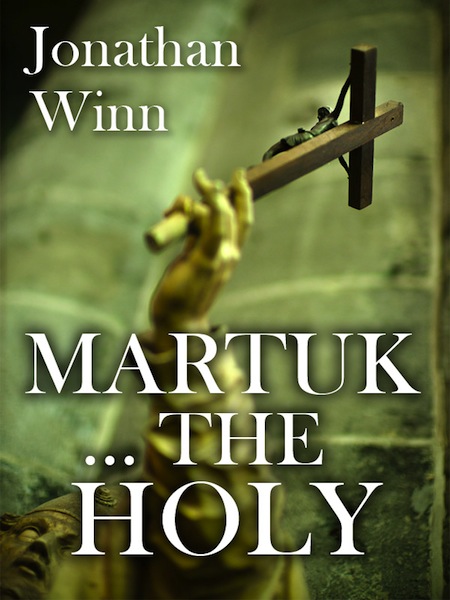 Doomed to walk this earth forever, Martuk is the chosen – the damned. He is immortal, powerful, but don’t mistake him to be holy.
Doomed to walk this earth forever, Martuk is the chosen – the damned. He is immortal, powerful, but don’t mistake him to be holy.
Martuk … the Holy is a blend of a few different genres. I would probably categorise it as a quasi-historical literary fantasy horror. It tells the story of Martuk, born in an ancient past, into a culture I had trouble placing specifically, and sacrificed into immortality. The story is told by Martuk himself through frantic memoirs he composes in current day Paris. The memoirs comprise of two specific periods in Martuk’s past, his childhood and his violent entry into immortality, and his encounters with Jesus Christ and his disciples.
The author has a very interesting way of communicating a story. I often see exhortations of “show don’t tell”. To me, the author indulges in neither. The novel is a complex blend of images, impressions and suggestions, where comprehension is at a visceral level. It was often a bewildering but also magical experience and I sometimes felt like I was a co-narrator. The imagery was often disturbing and very physical. There was a great deal of touching and focus on hands, feet, smells and bodies in general, the prose almost throbbing with a raw sexuality. The writing really impressed me, although I did wonder if the repetitive focus on hands in particular was deliberate or could perhaps have been edited a little. I was beginning to think the author had an obsession with paws, monstrous paws, enormous and strong hands and otherwise.
Although the history of Martuk was so selectively told, I was very happy with the selection chosen. Martuk’s beginnings reminded me a little of early South American cultures with small forest tribes and large impressive cities full of blood and sacrifice. However, given the direction of the story, Martuk’s childhood would most likely have been in an early Middle Eastern culture. The narrative is full of mysticism and dark gods, doomed kings and greedy priests. It’s hard to get full control of the story being told, the essence remaining just out of grasp like a barely remembered nightmare. However, it left a strong impact regardless; the poetic imagery absorbed rather than merely consciously processed. However, for me the jewel was the narration set in Judea in the time of Jesus Christ. I have a weakness already for the retelling of Christ’s story and the author has succeeded in adding another favourite to my list rivalling the story-within-a-story of Pontius Pilate in Bulgakov’s The Master and Margarita. There were scenes in this section of the novel that took my breath away. I don’t think I could possibly have asked for more and I don’t think I could adequately elaborate on my satisfaction without gushing.
Martuk is obviously the main character in the story and so I felt like I learned more about him than about those he encountered. However, I witnessed a marvellous depiction of Judas Iscariot and Jesus Christ himself. The author chose to display his characters in intimate moments and impressions through the rather strange perspective of our demon-possessed immortal, Martuk. It is through his eyes that we see the madness of the wounded king, the diabolical ruthlessness of the elder, the passionate faith of Judas, the doubts of Jesus and the prescience of Mary Magdalene. Although none are in focus for too long, they leave their mark.
Martuk … the Holy is a very dark and fantastical tale where angels and demons blend together; where violence and sexuality are entwined and madness and clarity are confused. It’s probably not a great book for those who like clear narratives or resolved endings, nor for those who avoid violence and darkness. But for the rest of us, this is a journey worth taking in my opinion. There are already two side-story novellas in the Martuk series, which I have already purchased and enjoyed. Additionally there is destined to be a sequel which I am ready to consume once it becomes available.
I wonder occasionally, if a book hits the mark with me like this one has, whether I lose my ability to see its value for others; whether I simply ride my personal wave of satisfaction rather than dissect and analyse in an impersonal matter. Perhaps this is the case, but it’s not going to stop me from highly recommending this book, because there’s one thing I do know, and that is – surf’s up.
Rating: 5/5
Price at the time of review: $2.99 US
Available: Amazon, Smashwords, Kobo, Barnes and Noble, Diesel
Author site: http://www.goodreads.com/author/show/5781265.Jonathan_Winn
GoodReads page: http://www.goodreads.com/book/show/13555269-martuk-the-holy
“Gunwitch: A Tale of the King’s Coven” – by David Michael
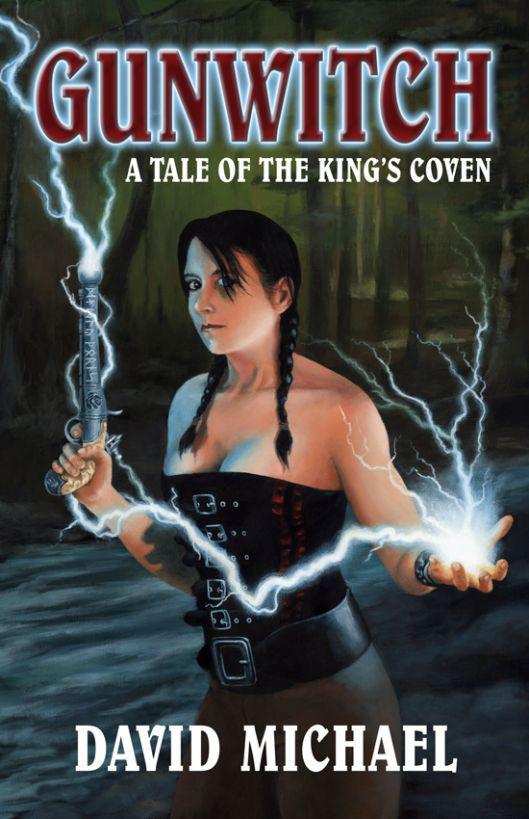 Rose Bainbridge takes on the job of escorting the daughters of Colonel Laxton across the Bayuk to visit him. But this is one trip that is not going to go according to plan.
Rose Bainbridge takes on the job of escorting the daughters of Colonel Laxton across the Bayuk to visit him. But this is one trip that is not going to go according to plan.
Gunwitch is a colonial American adventure story told through the fascinating goggles of Steampunk. So this novel already has a head-start with me. Firstly, it happily resides in a fantasy sub-genre in which I have a keen interest and secondly, I’m already a bit of a fan of the author, David Michael. So it encouraged me that the story grabbed me immediately. The gunwitch concept is not fully revealed at once and Rose’s history is shrouded in mystery slowly revealed via parallel timeline throughout the novel. The author cleverly got me fascinated with Rose and her history, her friend Chal with mysterious powers that Rose wants to keep hidden, the very cool Ducoed who obviously has an unpleasant past relationship with Rose and even Colonel Laxton, the destination of the escort job. I couldn’t possibly have been more “hooked” in the early stages.
The story is a multiple point-of-view tale and we get to see the journey mainly through the eyes of Rose, Ducoed and Margaret, one of Colonel Laxton’s daughters. Additionally, the story covers two timelines, that of the trek through the Bayuk and that of a younger Rose and Ducoed before they became gunwitches for the King’s army in England. I enjoyed the early story of Rose as it helped flesh out her character and allowed me to gain an understanding eventually into the enmity between herself and Ducoed.
As expected, the trip through the Bayuk was not without incident. And this is where I became a little lost. Up until a point we’re travelling with a small party until a surprise attack from an unknown foe separates Ducoed from the others. From here, the story alters significantly. I mainly had difficulty with this section because of the sudden introduction 0f new creatures with similar names that remained confusing to me throughout the rest of the book. The shift was jarring; I either didn’t cope where I should have, or the author could have transitioned a little better. Unfortunately, this was not the only place where I felt a jolt. A stray sex scene spilled clumsily into view and the resolution for Margaret and Chal definitely needed further development to flow smoothly for me. In all cases the problem wasn’t the content itself, but rather the transition.
Even though I faced some disappointments from a story point of view, I didn’t have similar complaints about the characters themselves. They were all worth the effort and I would enjoy reading more about them. Rose was a great character – tough, but insecure. She’s the heroine of the story and definitely a worthy one. Her back-story was intriguing, with her reactions to Ducoed expertly crafted to have me wanting more information. There was little to disappoint. The secondary characters were equally interesting, particularly Ducoed whose background, while very similar to Rose’s, resulted in a very different character evolution.
I don’t think this is the only King’s Coven story planned by the author. An allusion to a dishonourable discharge from the army for Rose was not actually explained at all, but was obviously related to a significant incident in the past relating to Ducoed. The lack of disclosure by the author makes me think a prequel may be on the cards. There’s quite a bit of scope for a sequel also with enemies such as Umoya defeated but not necessarily vanquished.
Despite some clunkiness, this is a good story. The gunwitch concept is quite interesting, the kind of power hinted at in characters like Chal and the dark Umoya made me hope for more stories to be told in this world. Furthermore, Rose is a great vessel for a Steampunk romp through the frontier of Amerigon – the author’s version of America.
I think if you like Steampunk and are interested in a variation of the sub-genre in a setting outside of Victorian England, this could well be of interest to you. Of course, if steam-powered soldiers, gun-wielding witches and warlocks, reanimated corpses forming a relentless infantry and nature spirits incarnate don’t grab you at all, perhaps this is not for you. But I do think you’re missing out on a lot of fun.
Rating: 4/5
Price at the time of review: $6.99 US
Available: Amazon, Smashwords, Kobo, Barnes and Noble, Diesel
Author site: http://www.gunsandmagic.com/
GoodReads page: http://www.goodreads.com/book/show/12939363-gunwitch
“Pegasus Falling” – by William E. Thomas
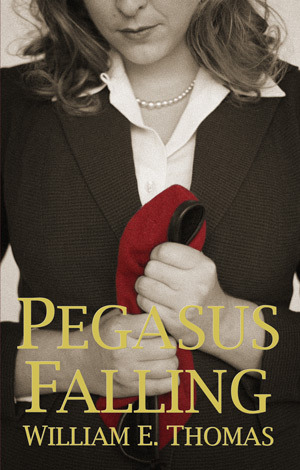 For Captain Stanley Adam Malcolm Parker, salvation from the torment of incarceration in a concentration camp was not provided by the allied soldiers who liberated him. It was provided by the Jewess who shared his despair, who clung to him as his strength dissipated. And after the war was won, he needed to find her again to give his life meaning.
For Captain Stanley Adam Malcolm Parker, salvation from the torment of incarceration in a concentration camp was not provided by the allied soldiers who liberated him. It was provided by the Jewess who shared his despair, who clung to him as his strength dissipated. And after the war was won, he needed to find her again to give his life meaning.
Pegasus Falling is the first part of a trilogy called The Cypress Branches and the story of its writing is almost as interesting as the story itself. Firstly, William E. Thomas writes from experience as he served in the parachute regiment during the second world war and then continued to serve in Palestine – the setting for the second half of this novel. So although I expect quite a bit of license has been taken to tell a good story, it is no doubt informed by experience. The author dedicated many years to seeing this book in print just before Alzheimer’s had him placed in care. The publishing of the original story as a trilogy is being accomplished by his grandson, Mike.
The story follows the plight of a captain in the paratroopers, trapped behind German enemy lines due to an intelligence blunder and taken to a concentration camp after an act of violence against an SS officer. The initial battle scenes did not dwell perversely on the horror of war. Actually it might have succeeded in glorifying it just a little as Captain “Sammy” Parker provides an entertaining focal point with his pluck and courage in the face of capture. Regardless, by the time he is rescued by the allied troops, it’s hard as a reader not to have been impacted by his say at the concentration camp.
However, it’s at Sammy’s rescue that I began to understand that this was not going to be just an historical war drama. Instead, the author starts examining Sammy’s broken life and the interdependence that has been created between him and Naomi during their imprisonment. Both souls remain empty and unfulfilled without the other until they meet again in Palestine. But again I’m foiled as this is not really the love story that the author necessarily wants to tell and another relationship develops until its rather abrupt conclusion in the closing chapters of the book.
Pegasus Falling was an interesting terrain to explore for me. It starts off as a war drama, moves into a post-war psychological exposé of concentration camp survivors, develops into a romance, examines the post-war situation in Palestine before the creation of the state of Israel, and ends in a thunderclap that admittedly left me shocked.
The narrative is carried mainly by three characters, the irrepressible Captain Sammy Parker, Naomi – the Jewish concentration camp survivor, and Lesley – a senior foreign official who worked in Germany at the end of the world war and afterwards in Palestine. All three characters are pretty well developed even if somewhat idealised by the author. Interestingly, all three of them also offer a stance on the creation of the state of Israel either indirectly or directly which made me feel that the author wanted to make a statement on Palestine more-so than he wanted to make any statement about Nazi Germany. Naomi’s final speech was more profound than anything stated or implied earlier:
“No Michael, this is your home. My home is in Germany. Sammy was right, he was always right, I don’t belong here. You might, but not me. I am a German, not a Jew. I am just an ordinary German Hausfrau who happens to be Jewish and I am going home.”
There were weak points for me. The romance between Lesley and Sammy was almost cloying and the existence of sexual inexperience of that magnitude for characters that age seemed a little hopeful. The soap box on Palestine was fine, except I did feel that the author had set up a particular scene to deliver “the lesson”. As mentioned, Naomi’s parting words had more impact than any lecturing through the other characters regardless of eloquence. But overall, I really enjoyed the story. It carried me along allowing me to experience places I’ve never been in a sweeping tale of war, love, loss and the unbreakable bonds that are created through a horror shared.
It is probably too late for William E. Thomas to understand that someone is reading and enjoying the work he committed decades of his life to writing. But for what it’s worth, I’m announcing it anyway.
Rating: 4/5
Price at the time of review: $2.99 US
Available: Amazon, Smashwords, Kobo, Barnes and Noble, Diesel
Author site: http://www.acuteanglebooks.co.uk/
GoodReads page: http://www.goodreads.com/book/show/13606888-pegasus-falling
“The Whitechapel Gambit” – by Marcin Wrona
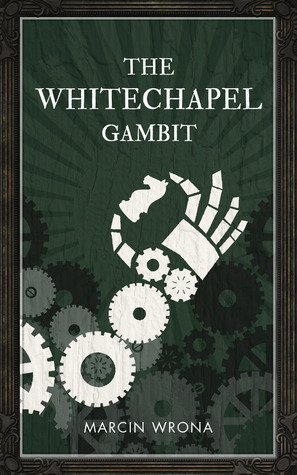 In the working class district of Haversham, Squeak saves a company and dooms himself to poverty until a benefactor gives him a second chance. Thus we follow a poor cripple’s unlikely rise – but for what purpose?
In the working class district of Haversham, Squeak saves a company and dooms himself to poverty until a benefactor gives him a second chance. Thus we follow a poor cripple’s unlikely rise – but for what purpose?
The Whitechapel Gambit is a rather interesting take on the Steampunk sub-genre where the author focuses less on the extravagance of a Victorian steam empire and more on the underbelly – the poor and unfortunate, the seedy and the criminal. And in our tour of the less savoury, we also see the corruption of power and the unrelenting thirst of revenge.
I admire the approach the author has taken to reveal this world to the reader. There’s never an explanation of how this world is made up; the reader discovers it in pieces. And it’s quite an interesting world to explore with quite a bit of scope for future novels. I also like the way the author only focused on what was deemed important to the story. We’re not marched down endless tangents only to wonder in the end what purpose they served. Instead we’re participants in a focused story that admittedly starts with some confusion but is slowly resolved. Having said that, parts of the execution did give me some concern.
The structure of the story itself I felt lacked a little clarity. The first part of the book follows to narrative up until a certain point. Then the second part seems to follow-on from this briefly until we’re suddenly – without any warning – hit by a parallel timeline narrative. I found myself completely disoriented for a chapter or two before I adjusted and that was somewhat damaging to my overall enjoyment of the story. So to prevent a similar shock to potential readers, there are two narratives we follow in the book. One with Squeak as a young child and one some years further on with Squeak as an adult. The introduction of Squeak’s adult phase will arrive suddenly, so remain calm, continue breathing and equilibrium will return.
Additionally, the author introduces a chess metaphor somewhere in the second part of the book and that metaphor carries through to the ongoing chapter headings. It’s rather clever once it gets going, but it gave me pause. I felt like the author had this great idea of creating a narrative that was represented by moves in a chess game. However, not all of the story could fit into the metaphor so an initial chunk of the book followed a different structure. It lent the story a certain air of disjointedness.
Once I got myself over the structural hurdles though, there really wasn’t much to complain about. I’ve already mentioned that I enjoyed the world and how it was revealed to me. I enjoyed the irrepressible Squeak, the mysterious Sir Nicholas and the various other characters key to the story. I enjoyed the plot as it become clear although it might have been nice for the machinations to have been a little more intricately woven. I enjoyed the actual Steampunk elements (because that’s how I roll) and I did find the conclusion satisfying in its ambivalence.
I think if you already like Steampunk, you should add The Whitechapel Gambit to your list. It doesn’t wallow in steam-powered pseudo-futuristic gadgets and industry as much as it could have, although the trappings are definitely there. However, its focus on subjects like colonisation and class division while still giving you all the greed, plotting and revenge you could want make it an interesting take on this sub-genre and worthy of consideration.
Rating: 3.5/5
Price at the time of review: $4.99 US
Available: Amazon, Smashwords, Kobo, Barnes and Noble, Diesel
Author site: http://marcinwrona.ca/wordpress/
GoodReads page: http://www.goodreads.com/book/show/13628677-the-whitechapel-gambit
“Season of the Harvest” – by Michael R. Hicks
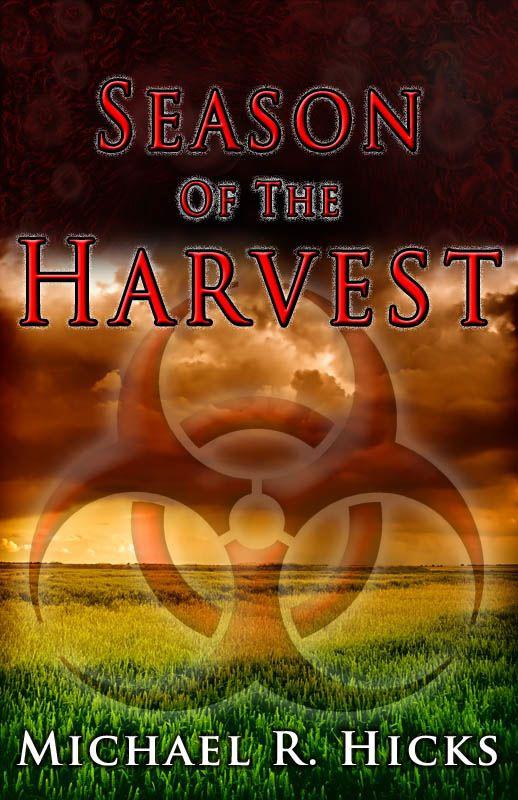 What if the biggest conspiracy, the ultimate danger to the human race was in the very food we eat?
What if the biggest conspiracy, the ultimate danger to the human race was in the very food we eat?
Season of the Harvest is not really a cautionary tale about the dangers of genetically modified food, although it did have me thinking about the disturbing possibilities of using agriculture as a weapon – a very unpleasant thought. More-so, this novel is a completely fantastical tale which could have sprung into being after the author was reading an article about genetically modified food and asked “What if..?”. The result is a page-turning thriller describing a conspiracy that goes all the way up and quite a bit beyond.
Our main character, Special Agent Jack Dawson, is introduced as the friend of an FBI agent killed in the line of duty. His close friendship with the victim makes it impossible for his superiors to keep him out of the case and the subsequent death of another friend turns him into the prime suspect. Suddenly a career FBI agent is on the run from his own government and from there we follow him “down the rabbit hole”. I picked that phrase intentionally because the author uses it a few times throughout the novel and as apt as it may be, it bothered me after a couple of repetitions. I enjoyed the character although he was a bit too perfect for me: amazing analytical mind, a strong tactician, soft and cuddly on the inside. He was more a fantasy that a real human. This didn’t really detract from the excitement of the story, but I did feel like it might be nice if he had a few flaws.
Naomi Perrault is the super-duper smart genetic engineer transformed into purveyor of little-green-men conspiracies. She is the initial target of investigations and that most used of conspiracy thriller devices – the “is-she-isn’t-she” criminal. I did like Perrault’s character. Although she had a touch of the super-human feel like Jack, I felt she exhibited a little more humanity, made a few more mistakes. A few other characters add varying levels of interest to the story and even our agent killed in the first chapter has a surprising longevity in the story.
The plot uses quite a few conspiracy thriller tropes: hero to hunted, kidnapped to converted, all-the-way-up collusion and desperate race against time. However, the author executes it all well and I felt immersed in the mystery, revelation and then non-stop action. There were very few punches pulled, the author unafraid to push the action to the extreme. Some of it felt a little over-the-top but it certainly didn’t stop the pages turning for me. Even the nature of the conspiracy itself was intriguing and I appreciated that the author didn’t feel the need to turn a great premise for a science fiction thriller into a lecture on the evils of genetically modified foods.
So what didn’t I like?
Firstly, I wasn’t overly fond of the romance between the main characters. It felt a little off given the content of the story. I didn’t believe it and I didn’t see how it added anything to the plot. I felt subjected to an artificial rule that handsome action man hero needs to end up with beautiful genius geneticist. It didn’t leave me dry heaving in the gutter or anything equally dramatic, but I could have lived quite happily without it.
Secondly, our dead agent plants a crucial piece of information for our heroes in a coded file. This, in itself, made perfect sense. However, the manner in which it was encoded was absurd. It nicely filled the password cracking trope that works quite well in a thriller and it obviously exercised the author to produce so many loosely linked puzzle pieces for the decoding, but I can’t believe anyone, regardless of the level of genius, could devise such a complex passkey in only a minute or two under extreme pressure.
Lastly, a small one. Having two separate characters refer to a “special place in Hell” being reserved for them is a mistake. For me, it temporarily replaced both characters with the author – something you never want to experience. It was only fleeting, but made enough of an impression that I felt the need to point it out.
Season of the Harvest is not actually a standalone novel; the sequel, Bitter Harvest has recently been released. For those who like standalone books I would not advise against this novel as it could easily be read by itself. There is resolution and although there is a hint of more to come, it’s only a hint. Of course for those who like trilogies, two books are already available, so dive in. I’ve already put the second book on my wish list.
I liked this Season of the Harvest. It was exciting and demonstrated to me that using the formula of genre is not necessarily a bad thing. There were one or two misses along the way, but overall it was an enjoyable ride and I would recommend it to those who like conspiracy thrillers – especially those that don’t mind a big helping of science fiction in the mix.
Rating: 4/5
Price at the time of review: $2.99 US
Available: Amazon, Smashwords, Kobo, Barnes and Noble, Diesel
Author site: http://authormichaelhicks.com/
GoodReads page: http://www.goodreads.com/book/show/10448215-season-of-the-harvest
“Lovers and Beloveds” – by MeiLin Miranda
 Temmin is the heir to the throne of Tremont, about to turn 18 and enter into manhood, and is still a virgin. That last detail might not seem so important – just a small item which might lead to an entertaining coming-of-age dalliance in an otherwise straightforward fantasy novel filled with kings and queens, intrigue and violence. However, in Lovers and Beloveds, Temmin’s virginity is key to the story.
Temmin is the heir to the throne of Tremont, about to turn 18 and enter into manhood, and is still a virgin. That last detail might not seem so important – just a small item which might lead to an entertaining coming-of-age dalliance in an otherwise straightforward fantasy novel filled with kings and queens, intrigue and violence. However, in Lovers and Beloveds, Temmin’s virginity is key to the story.
Welcome to Tremont, a kingdom with nobility (the haves) and peasants (the have-nots) and a full compliment of gods and goddesses – including Nerr and Neya, the Lovers. And this is where our hero comes in. After meeting Allis, the “Embodiment” of Neya, Temmin is quite obviously besotted and sets upon a path to become a supplicant at the Lovers’ temple. Actually, that pretty much wraps up the plot of this story. However, what I’m not doing justice to is the work the author has done to create an interesting society where sexuality is largely embraced and even worshipped in all its forms.
So let’s discuss the sexuality in Lovers and Beloveds. It’s unavoidable in this case as the majority of the text either deals with sex scenes, discussing sex or thinking about sex. Firstly, only those “of age” need apply to read this book. Secondly, if you don’t like explicit sex scenes, you will not like this book. Thirdly, if you are fairly narrow in your interpretation of what acceptable sexuality should be in literature, you will not like this book. However, if you like explicit sex scenes between men and women, and men and men, and women and women, trios, groups and even displays of public sex on religious holidays, there might be something in this book for you. Let me rephrase that – buy this book, you’ll probably love it.
I’m not personally motivated to read a book with a “by the numbers” exploration of every facet of sexuality imaginable (which I have to say this book felt a little like at times). So it was going to be difficult for this story to make a lasting favourable impression on me. So was there anything here I liked? Luckily, there was.
I actually liked the way sexuality was integrated into the society and religion of Tremont. Even if the cynic in me thinks of it as a convenient device to legitimise a sextravaganza, I have to admit that it was very clever all the same. It even had me imagining what my own society might be like if sexuality was embraced in the same way. Additionally, I quite liked the characters in the book. Temmin himself was quite dim in many ways, but remained lovable throughout. It was hard to think ill of him learning about his future responsibilities as king while also trying to learn about himself and what kind of man he wanted to be. He’s also surrounded by some interesting characters: the enigmatic Teacher, the loyal Jenks, even his obstructive father, Harsin. They all added colour and flavour to the story.
Some of the problems I had with the novel included the teaching of Temmin via a magical storybook. Through this device, We follow the narration of a piece of early Tremontine history. I think this magical book is going to be an undercurrent for the series, but I’m not entirely sure how the story of a woman cursed with the unyielding desire to have sex with any man who wants her forms any part of an education for Temmin. To me, the book merely fulfils the author’s need to tell a saucy tale within a saucy tale. Less problematic was the fact that there are some mysteries that don’t get revealed by the end of the first book. Why is it important for Temmin not to know that Jenks is actually Colonel Jenks – will he ever find out? What is the real story behind the Teacher and the Traveler Queen? And are we going to get more intrigue and story in the next volume, or are we going to spend the whole book trapped inside Temmin’s sexual awakening?
Unfortunately for me, although I’d love to know the answer to some of those questions as there really are some intriguing elements to Lovers and Beloveds, I just don’t think I have the stamina for another multi-sexual Karma Sutra. I applaud the work that has gone into it and I know the sophistication of its telling will find an appreciative audience. If you feel like you could be the target audience, there really is no need to wait.
Rating: 3/5
Price at the time of review: $4.95 US
Available: Amazon, Smashwords, Kobo, Barnes and Noble, Diesel
Author site: http://www.meilinmiranda.com/
GoodReads page: http://www.goodreads.com/book/show/9555442-lovers-and-beloveds
“The Annihilation of Foreverland” – by Tony Bertauski
 He wakes up in what looks like a doctor’s office. He is told his name is Danny Boy. He doesn’t know who he is or how he’s come to this place, but the old man is telling him everything is going to be alright.
He wakes up in what looks like a doctor’s office. He is told his name is Danny Boy. He doesn’t know who he is or how he’s come to this place, but the old man is telling him everything is going to be alright.
The Annihilation of Foreverland is a science fiction conspiracy novel where the story starts in a fairly non-threatening environment and quickly moves towards uncertainty and finally, revelation and crisis. It’s not a new formula, but it’s one that quite often works well with me and this book was not an exception. There’s something so intriguing about the “something not quite right” formula. I want to dig just as much as the characters in the story and the deeper I get the more I want to know.
Bertauski’s setting is an island with boys who have a kind of amnesia (more like an assault of other people’s memories) and are being treated in a revolutionary program that seems to involve lots of game playing, sun and healthy eating. That is until we get to the Haystack. This is meant to be the crux of treatment and it’s pretty unsettling. But it’s in the Haystack that we start widening the parameters of the story through the eyes of Danny Boy – newest “patient” on the island. The sessions at the Haystack seem to get wilder as the story progresses, but I would recommend just running with it as it makes the story more enjoyable.
And I guess that’s where I come to my observation about the target audience of this novel. The young adult label is well-earned. For a start, the pacing is great and the mystery develops with a successful blend of unease and tension that I believe younger readers will gobble up. But on the flip side, there’s a couple of elements that I think would be more easily accepted by younger readers than perhaps adult readers. Lucinda is an enormously problematic character in this story. In fact, in my mind, she makes little sense but is given so much power as a plot device that it’s impossible not to constantly face the absurdity of her role. Additionally, Danny Boy as a character is just too intuitive and too intelligent for my liking. On many occasions he borders on the super-human. However, I feel like I need to give a big concession here as I think younger readers will have no problem with Lucinda or Danny Boy.
Moving on to the characters, Danny Boy is an interesting read despite my issues. I enjoyed watching this thirteen year old cope with the island, the uncertainty of his memories, the Investors, the Director and the Haystack. As he slowly starts to understand more about who he was before the island, we also start seeing more overt rebellion from him. His character becomes more resilient, resourceful and at the same time, much more interesting.
Reed is where much of the mystery of the story starts. Who is this boy and why is he refusing treatment? Reed is the character that really sows the seed of doubt for Danny Boy. We do get to see some of the story through the eyes of Reed, but he is a character on the verge of breakdown for the entirety of the story, so his point of view isn’t as entertaining as that of Danny Boy. But he’s an important character – one that infuses the island with disharmony, a necessary atmosphere in a story like this one.
I also found the Director interesting in this story. His character was quite paradoxical with actions and sentiments not often aligning. This is probably what I liked most though; someone so invested in an ideal, but whose actions seems so contradictory. As the story progresses his sentiment is swept away in his relentless pursuit of Lucinda and when certain revelations bring his character into sharp focus there is no longer any chance of this character being misunderstood. I enjoyed the unveiling.
The writing had a few errors, enough that I mention it but not enough to stop me from recommending the book. Other than that, the author did a good job of portraying the island and the characters on it.
Those who can’t put aside the critical adult might have a few problems with The Annihilation of Foreverland, but those who can appreciate where this story is targeted are going to enjoy the ride. The atmosphere is just right. Danny Boy has a good set of eyes through which to witness the conspiracy unfolding. If not young, at least be young at heart and I think this story will satisfy.
Rating: 4/5
Price at the time of review: $3.99 US
Available: Amazon
Author site: http://bertauski.com/
GoodReads page: http://www.goodreads.com/book/show/13368166-the-annihilation-of-foreverland
“The Tube Riders” – by Chris Ward
 In a future Britain where travel is restricted and the Governor rules with an iron fist, the Tube Riders stumble across a secret and become Mega Britain’s most wanted.
In a future Britain where travel is restricted and the Governor rules with an iron fist, the Tube Riders stumble across a secret and become Mega Britain’s most wanted.
The Tube Riders is a book in which several scruffy, disenfranchised youths are the main characters. However, this does not mean that this book would comfortably sit in the young adult category. These kids have a dark background and the author lets the harshness of a cruel future Britain leak through the pages. Rape, prostitution, violence, murder and the omnipotent presence of a government which “disappears” people on a regular basis form the reality in which these teenagers survive – and survive they do. I feel the author offsets this harsh existence by presenting us with a bunch of intelligent, resilient and loyal friends who jump onto moving trains for entertainment. The setting, the form of entertainment and the young protagonists themselves had me hooked from the start. I sometimes felt the author was channelling Michael de Larrabeiti’s Borribles trilogy, one of my favourite journeys into a darker folkloric London.
The action in the first part of the book was gripping. A gang war builds and in escaping, the Tube Riders accidentally discover a secret that could get them killed. And this is where the relentless manhunt across Britain commences. Relentless is a word that so accurately describes the chase itself and the pursuers, a mix of government agents and nightmarish creatures devised in laboratories run by a sadistic government. The author gives us a barrage of perspectives from which to observe the action bouncing from character to character. Sometimes this can be disorientating in a story, but I actually found that it helped flesh out different characters in the novel from the Tube Riders to the Governor himself. Consequently, I felt more invested in the story which can only be a good thing.
It’s important to have disbelief in check throughout this book as the story pushes the boundaries in some places. However, I think the author tries hard to inject credibility. A group of kids can evade an organised manhunt because the country has been restructured to discourage organised movement. The character, Switch, steers our gang all too true, but revelations make sense of his eerily accurate bearings (although this is really pushed to the limit as the story progresses). The man-made paranormals, if I can call them that, are unlikely, but I still had difficulty scoffing and I thought their inclusion made the flight all the more desperate. Then lastly, the success of this self-appointed dictator of Mega Britain seems unsustainable until an equally fantastical explanation makes some sense of it. In any case, I became happy to check my cynicism at the door which means that something had to be working well.
There are several major characters that we spend time with thanks to switching points of view throughout the novel. However, Marta is arguably the principal character of the story. The leader of the Tube Riders remained an interesting blend of resilience and vulnerability to me and in some ways she was a hopeful look at what a teen surviving in such a bleak existence could be. The death of her parents and the disappearance of her brother do not rob her of humanity. She remains fierce, she does what she has to do, but she also remains compassionate and loyal. The Tube Riders become her family, one that she is prepared to fight for.
However, although Marta is the main character, there are more interesting characters in my opinion. The nasty knife-wielding Switch, shows several different shades of colour over the course of the story. Jess is jolted by the horrific death of her parents and transitions from a sheltered, innocent girl through grief and loss into a callous and violent instrument of vengeance. However, most interesting to me is the walking horror that is Dreggo. Part terminator, part crushed spirit I enjoyed watching her battle for her own humanity knowing that there could be no happy ending.
There were a few issues I had with the book, but thankfully not too many. There were a few more errors than I’d like to see but none of them exposed an inability to use the English language. Additionally, I had a bit of an issue with the finale. The action by this stage had become fever pitched and rather absurd, but that wasn’t as much of an issue as it remained immensely entertaining even if possibly pushing that suspension of disbelief a little too far. What bothered me a little was how unresolved the ending was. Because I was on every step of this journey with the protagonists I was invested in their success of failure, but the author left that hanging to some degree, the possibility of a sequel dangling with it. I could understand that it would take far too much at that stage to really provide a conclusion and some hundreds of pages of resolution reduced to a mere epilogue probably would have angered me more, but I couldn’t help but feel a little flat.
My few reservations aside, I enjoyed The Tube Riders a great deal. The author has recently broken up the volume into three parts and I would highly recommend grabbing the first and giving it a try if a 500+ page novel from an indie author seems too high a risk. If you like your action set in a dark and cruel future – and who doesn’t – you owe it to yourself to give this a go.
Rating: 4/5
Price at the time of review: $4.99 US
Available: Amazon
Author site: http://www.goodreads.com/author/show/5757409.Chris_Ward
GoodReads page: http://www.goodreads.com/book/show/14121078-the-tube-riders
